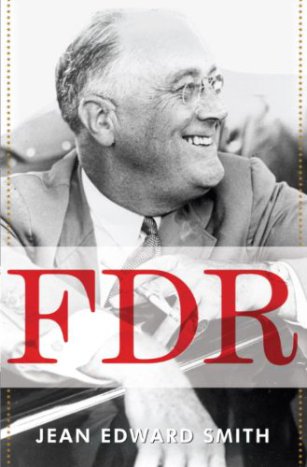
FDR is an impressive man. I had a high regard for him going into this project, and reading Jean Edward Smith’s biography only elevated my opinion. Between the New Deal and the US war record, FDR left a formidably strong legacy that puts him firmly into the ranks of Washington and Lincoln in terms of presidential quality.
FDR’s background gives no hint of the president he was to become. Born to a life of enormous privilege, FDR hardly looked like a champion of the poor, or even really in touch with the average American. Smith traces the shift in FDR’s thinking to two events: being stricken by polio (commonly cited as a turning-point for Roosevelt); and having to turn his back on his relationship with Lucy Mercer after his infedility came to light. This second point is particularly interesting as I had had no idea of FDR’s relationship with Lucy Mercer until Francis Russell obliquely mentioned it in The Shadow of Blooming Grove, but Smith makes the women in FDR’s life central to his thesis, namely that Roosevelt was heavily influenced by four women in his life: “his mother, Sara; Lucy Mercer, the woman he loved; Missy LeHand, the woman who loved him; and his wife, Eleanor”.
In a sense, what is most impressive about Roosevelt is how much of that for which he is known came from him. Some presidents capture the mood of the times, or inspire, and leave others to work out the detail, but Roosevelt managed this as well as being the origin of many important policies. A number of the specific details of the New Deal came straight from his head; the basic outline for Lend-Lease came from a few days left to his own devices; and Roosevelt laid out the basic structures of the UN before he died. He had a rare capacity to move between the big and small picture and to see how the two connected.
It is somewhat worrying to consider, however, how dependent the country was on FDR. It’s always risky to engage in speculative history, but I was left wondering how the country would have fared if Hoover had won re-election in 1932. Or, given that was highly unlikely with the state of the economy, what if Roosevelt had lost the Democratic nomination? Would President Al Smith have taken the risks in vitalizing the economy that FDR and his administration did? And what about in 1940 when Roosevelt ran for a third term? Would a President Wendell Willkie have navigated the complexities of pre-war diplomacy and handled war policy as effectively? I really suspect not. Although one can never know, and one can always argue that those other candidates couldn’t have won since the democratic process chose the right outcome, Roosevelt’s battle with polio makes it abundantly clear that his presence on the ballot was a stroke of good fortune.
I bring this up because it seems that FDR possessed a remarkably handy skill-set. His naval background gave him a good understanding of how war is conducted, and allowed him to make judgements of strategy over the conduct of the war. His consummate political skill kept Congress (largely) and the people on his side. If one compares him to Wilson, who had superb academic strengths (and with the Fourteen Points was possibly equally visionary) but utterly failed on the political side, FDR’s ascendency in the 1930s appears felicitous.
FDR’s legacy is certainly not unblemished, and although Smith goes into detail about his court-packing attempt in 1937, the internment of more than 100,000 Japanese-Americans from 1942 receives little coverage. Overall though, this is an excellent and thorough biography that does a superb job of not getting bogged down in the weeds. I also particularly enjoyed the occasional footnote Smith inserts describing his own memories of the FDR era: they personalised the account and provided a striking reminder that I have (finally) moved into history that is contained within living memory.
Advertisements Share this:




